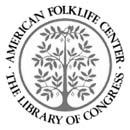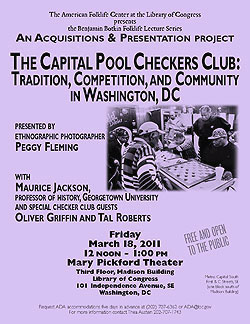| |
|||
|
|
The American Folklife Center at the Library of Congress March 18, 2011 Event Flyer The Capital Pool Checkers Club:
|
|
Like many other rewards in my life, my introduction to the Capital Pool Checkers Club in Washington, DC, was accidental. For years I'd been working on a photography project about people who live in Washington. A friend, Pernell Lee, told me about his checkers club and brought me around to introduce me to its president, Tal Roberts. As Tal and I talked in the club, on a Saturday afternoon, members arrived and I watched and listened. This was too good a photography opportunity to pass up: I offered to make portraits of the members, then decided to interview them about their game and about their lives in Washington — how they got here if they weren't natives and how they fared during the city’s turbulent years of inspiration and of despair.
The club looks like what you might imagine: three tables set with six checkerboards in the center of the room. Oldies but goodies soul music playing, punctuated by the staccatos of the checkers as they are moved and the triumphant declarations, "Put a hat on it" or "Crown me." Cell phones ring, the vending machine hums, the refrigerator door opens and closes, corn pops. Adorning one wall are hundreds of snapshots of current and former members. Trophies reign high up on a shelf. The sofas and chairs are worn with use. The men sit, stand, watch and play, kibitzing. The atmosphere is friendly but the game is serious and competitive.
The members of the Capital Pool Checkers Club have gathered at 9th and "S" Streets N.W., in Washington since 1985. The club is an affiliate of the American Pool Checkers Association. The game played by the members is called Spanish Pool Checkers. According to the association, Spanish Pool has been played, predominantly by Blacks, throughout the United States. "Straight Checkers was too slow and not exciting in moving nor jumping so it was not as appealing," the association says. The APCA holds national and regional tournaments. While many of the members of the Checkers Club compete in the tournaments — and often win — some come to the club just to relax in the camaraderie.
The men know one another by their "handles," their "checker names." "Sometimes you know people by their nickname and don't know their real name," Tal said. "We had one called E. C. Taylor, and his name was E.C. We never knew what his real name was because his real name was Ecclesiastes. And there were a lot of people couldn't pronounce it. And nobody could spell it."
In this presentation you will meet The Shark, Chicago, The Stealer, Boy Wonder, The Weasel, Johnnie Cool, The Master of Disaster and The Hawk, among others.
I started photographing and interviewing the members on Saturday afternoons in January 2007. Most of the men are about my age, and, like me, many came to Washington in the 1950s for education and job opportunities. I was born in 1937, in California, the first daughter of an Italian mother and Irish father. When I graduated from college, my father gave me an airplane ticket to Washington, a one-night hotel reservation and one hundred dollars. It was August of 1959. My first job was as a secretary in Senator John F. Kennedy's office. I worked for Kennedy for four years — in the Senate, during his presidential campaign and in the White House, always on civil rights issues.
Like these checkers players, I remember the historic moments: marching on August 28, 1963 and being at the foot of the Lincoln Memorial for the "I Have A Dream Speech"; the city erupting in flames in 1968. Here I raised my children in the 70s and here, on a bitterly cold but joyous day, January 20, 2009, I attended the Inauguration of Barack Obama. Since the first day I arrived, I have, like many of these men, watched the city struggle and grow and shift.
I am grateful for the hospitality shown me by the men of the Checkers Club. As player Tony Simuel said about Obama, "He really means to bring people together. That's how we solve problems that we have in the world, to have people working together. Just like you. If nobody gave you an interview, it's useless. So you come, and everybody work together to give a good interview."
Peggy Fleming
Peggy Fleming is a photographer who is currently in the MA Documentary Film program at American University. For three years she photographed and interviewed the men in the Capital Pool Checkers Club. Crown Me!, published in 2010, is a book of portraits and text about twenty-four members of the Capital Pool Checkers Club. At 9th & S is a ten-minute award-winning video she produced of the club. www.vimeo.com/crownme
In 1969. Fleming received an MA in Cultural Anthropology from George Washington University. In 1994 she retired from the National Park Service; she was a Park Ranger Naturalist/Botanist in Rock Creek Park.
 The American Folklife Center was created by Congress in 1976 and placed at the Library of Congress to "preserve and present American Folklife" through programs of research, documentation, archival preservation, reference service, live performance, exhibition, public programs, and training. The Center includes the American Folklife Center Archive of folk culture, which was established in 1928 and is now one of the largest collections of ethnographic material from the United States and around the world. Please visit our web site.
The American Folklife Center was created by Congress in 1976 and placed at the Library of Congress to "preserve and present American Folklife" through programs of research, documentation, archival preservation, reference service, live performance, exhibition, public programs, and training. The Center includes the American Folklife Center Archive of folk culture, which was established in 1928 and is now one of the largest collections of ethnographic material from the United States and around the world. Please visit our web site.
| ||||

